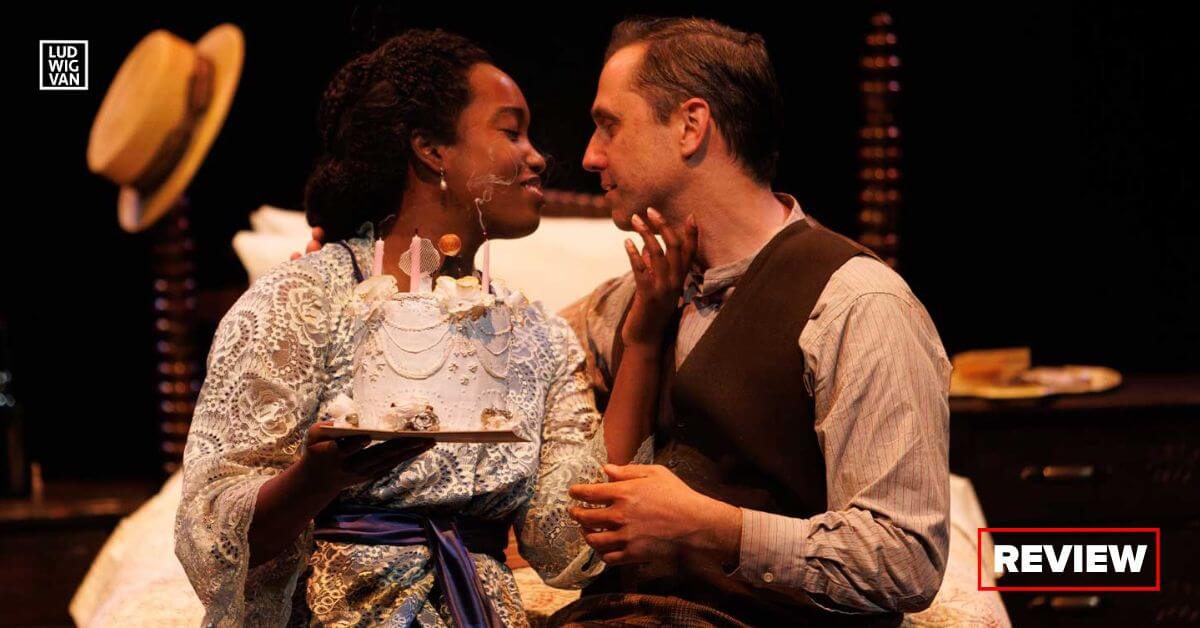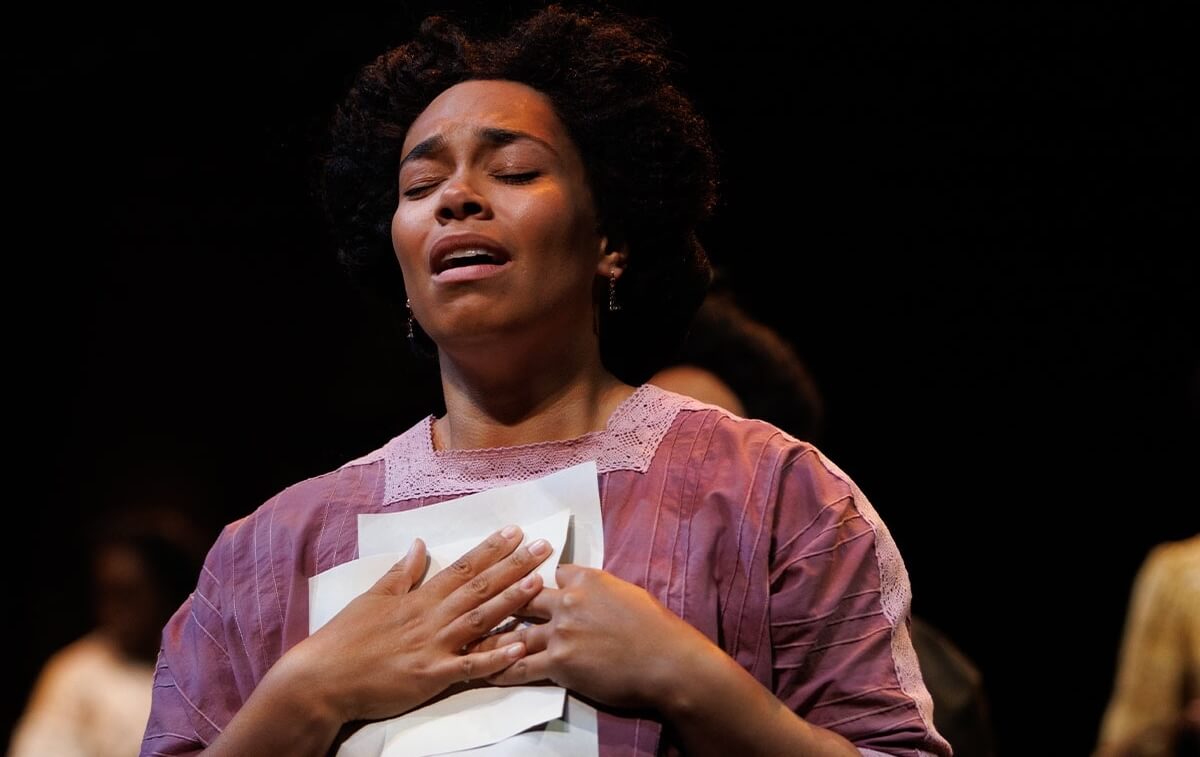
Stratford Festival 2023: Wedding Band by Alice Childress, directed by Sam White, Tom Patterson Theatre, Jun 20 to Oct. 11. Tickets here.
It has become de rigueur in these last couple of years for these big theatre festivals to feature a play of consequence by an acclaimed Black playwright.
While there are many plays pouring out of the Black community today that centre on contemporary issues, by going back to the Black classics, as it were, audiences are given a context to the Black experience. These plays by the Black pioneers of theatre contain the threads of the past that continue to impact Black lives today.
As a corollary effect, these large cast plays also provide lots of juicy roles for the excellent Black actors that this country is producing. And let’s be frank: it takes a big festival to mount a big play. If not Shaw and Stratford, then who?
The Playwright
Alice Childress (1916-1994) was a Black activist who also embraced many other social causes. The very question of race relations sits at the very heart of her canon of work.
Childress grew up in dire poverty in Harlem. She came from Charleston, South Carolina at age 9 to live with her maternal grandmother when her parents split up. Unfortunately, she had to drop out of high school when her grandmother died. Now on her own, Childress had to take on menial jobs as she tried to establish her career as an actor, and later a playwright.
Nonetheless, Childress grew up in a world that stimulated the imagination. Her grandmother, a former unschooled slave, had always encouraged Childress to write and tell stories. For example, they both used to look out the window and make up narratives about the lives of passers-by. In later years, the playwright always prided herself on being a self-educated woman without even a high school diploma.
Childress is a much-admired talent. She described her work as trying to portray the have-nots in a have society. “My writing attempts to interpret the ‘ordinary’ because they are not ordinary,” she wrote. “Each human is uniquely different.” She is acknowledged as the only African-American woman to have written, produced and published plays for four decades.
Childress is also known for never shying away from controversy, which is why it took so long for her early plays to get a Broadway run. Her edgy subject matter either scared producers away, or she refused to change her plays to make them more palatable for a White audience.
The Play — Childress’ Wedding Band
Childress wanted to be an actor after seeing a Shakespeare play in her youth. She became a playwright when she saw that there were pitifully few meaty parts for Black women.
The full title of the play is Wedding Band: A Love/Hate Story in Black and White (1962). In fact, Childress was one of the very few Black playwrights who included significant White characters in her plays, although in the latter part of her career, she concentrated on Black characters only.
Wedding Band was considered a hot potato because it deals with miscegenation — the interracial love between Black seamstress Julia Augustine (Antonette Rudder) and White baker Herman (Cyrus Lane). The play is set in Charleston in 1918 when miscegenation was a crime. In fact, in 1962, when the play was written, it was still a crime in 17 states.
As the play opens, Julia has just moved into a backwater neighbourhood to keep a low profile about her romance, although her disapproving landlady Fanny Johnson (Liza Huget) seems to know about it. As well, Julia can’t seem to avoid her neighbours, although all she wants is peace and quiet.

Mattie (Ijeoma Emesowum) is a laundress who also looks after a White child, Princess, who plays with her own daughter Teeta. The ultra-religious Lula Green (Joella Crichton), worries about her adopted soldier son Nelson (Micah Woods), going off to war.
The significance of the wedding band is that it gives a married woman a name and protection. When Herman comes visiting, he gives Julia a wedding band on a chain to wear hidden around her neck. The couple plan to go to New York, where they can be legally married. Unfortunately, Herman collapses in Julia’s room, deathly ill with the Spanish flu.
No one dares to call a doctor, terrified of the police finding out about the illegal romance, so Fanny sends for Herman’s formidable mother (Lucy Peacock) and his cowed sister Annabelle (Maev Beaty).
The inevitable confrontation between Herman’s mother and Julia is electrifying, with words that are shocking to the core. A Black woman has rarely, if ever, spoken to a White woman on stage as found in Julia’s tongue-lashing of Herman’s mother. The racism is vicious beyond belief, both anti-Black racism and anti-White bigotry, yet Julia’s invective earned a heartfelt round of applause from the audience.
Wedding Band is considered a masterpiece, and for good reason. Each character is a gem of a portrait, and we know exactly who everyone is. As well, the threads of racism are so very cleverly woven into the whole, that there is blame on all sides. Even Jews and Asians come under attack.
(And on a trivia note — the Shaw Festival mounted Childress ‘s controversial play Trouble in Mind (1955) in 2021 to great success. Now it is Stratford’s turn to showcase this great writer.)
The Production
Wedding Band has a very awkward set to configure. There are front doors to Mattie’s and Lula’s houses, with Julia’s house/bedroom in the middle, all of which is surrounded by the common yard.
Designer Richard H. Morris Jr. has put steps leading to two doors on each side of the stage for Mattie’s and Lula’s houses, employing exits that are already there. Julia’s bedroom slides out into centre stage when needed, which is also distracting in a way, but it does put that set piece in the middle, making it more visible for the entire audience.
Costume designer Sarah Uwadiae’s post-Edwardian garb is simply gorgeous. Each outfit cleverly gives us clues to where the women are in terms of class and status, for example, Fanny’s stylish outfit, set against Mattie’s menial worker. The men, of course, are always easier, but look wonderfully period, nonetheless. Lighting designer Kathy A. Perkins has bathed the set in the warm light of the South.
We should also mention the wonderful ragtime inspired Wedding Band score composed by the great Beau Dixon.
Acting and Directing
As for the acting, it is a standout, and it is very hard to single out first among equals. In Wedding — I choose all the women. They are superb. The script also echoes the cadence of Southern speech, which everyone has mastered quite well.
As for direction, Sam White found the right pacing, which I describe as relentless. Conversation never lets up for a moment. As well, White is dealing with a complicated script in terms of character, and has drawn out wonderfully realistic performances from her actors.
Final Thoughts
In essence, Wedding Band is about the purity of total love. In one of Julia’s speeches, she talks about the glory of being loved as one of the highest goals one can attain.
#LUDWIGVAN
Get the daily arts news straight to your inbox.
Sign up for the Ludwig van Daily — classical music and opera in five minutes or less HERE.
- INTERVIEW | Actor Diego Matamoros Takes On Icon Walt Disney In Soulpepper Production Of Hnath Play - April 16, 2024
- SCRUTINY | Opera In Concert Shine A Light On Verdi’s Seldom Heard La Battaglia Di Legnano - April 9, 2024
- SCRUTINY | Lepage & Côté’s Hamlet Dazzles With Dance And Stagecraft Without Saying Anything New - April 5, 2024



